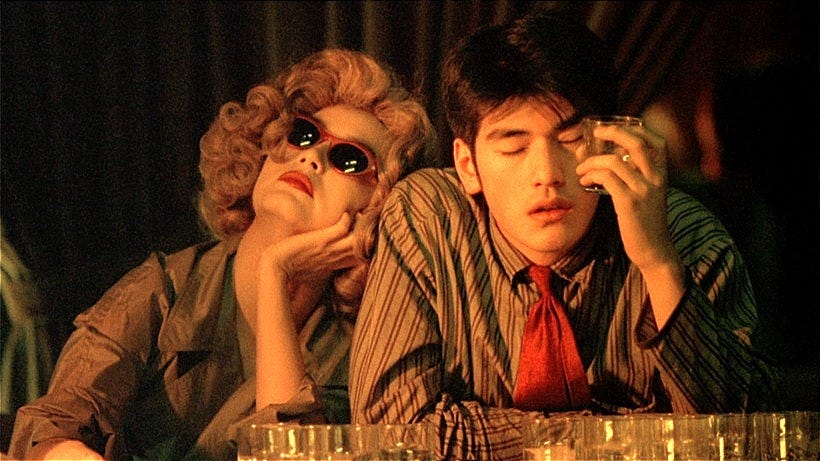You are not a unique snowflake
The Cinematologists // Newsletter #62 - April 2023
I'm in the members' bar of Picturehouse Central once again. I think this is the third newsletter I've managed to write here. I've always enjoyed writing in various locations; the mobility helps me feel like I'm "in the world" while writing, rather than being handcuffed to a desk at home. Upon reflection, it's the first draft that happens in these ephemeral hotspots. Editing and final proofreading (such as it is with me) has to happen in an environment of quiet calm, as though the stillness of the air molecules offers less resistance to the clarity and precision of sentences. Deadlines that have been nudged forward time and again have tested me more than in any other semester I can remember. Maybe it's always been this way, my current levels of anxiety merely amplified by recency bias. But I'm not going to bore you with my productivity tips once again. Go back to the January newsletter for those.
I was given training on marking consistency the other day, using the digital delights of MS Teams. Maybe you detect a teardrop of sarcasm in that last sentence. Spending hour after hour in online meetings isn't exactly a Christmas present of temporal value, I grant you. The software gets a bad rap, though, especially when compared to its prodigal twin, Zoom. It does have its uses. As I was frittering between screens in a very un-stylised, Minority Report-esque display of digital manipulation, someone on the team commented on the orderly organisation of my Dropbox folders. Now, this was a comment that, I have to admit, pleased me more than it should have. Tidiness is not something that has ever come naturally to me. Indeed, my girlfriend would say that when it comes to cleaning up our flat, my standards rate somewhere between adequate and disinterested. However, I like to think I'm reconstituted enough, as a man, not to fall into the trap of weaponised incompetence. I'm spitballing here a bit. Can you tell?
Let's get onto films. I had a sense of cinematic disavowal during this month, meaning watching films felt like something of a chore. There are waves of this detachment that hit me from time to time, probably caused by having to perform untrammeled enthusiasm for all things film in the day job. I wonder if doctors, after a long day in the surgery, settle down in front of Holby City or Grey's Anatomy. This last week, however, I saw quite a few films, new and old, in different contexts, that reminded me of how I (and probably many cinephiles) use the medium as a mechanism of orientation to the world and my place in it. But then, over time, because you change, the films change.
With my first-year students, our final Monday evening screening of the year was a trip to the Prince Charles Cinema to see Chungking Express, Wong Kar-Wai's fever dream of love-struck twenty-somethings living in a cinematic fantasia. Watching the film for the first time, probably in two decades, I relived the vitality, ephemerality, and coolness of the games of desire seen through the prism of a young director enamored with cinema and his own sense of audacity. Furthermore, Christopher Doyle's cinematography is raw, tempestuous, and randomly beautiful, chiming perfectly with the characters' fleeting, aestheticised encounters. When we got outside, most of the students said they liked the film but with caveats. As is usually the case when a film offers only an opaque narrative, they searched for the anchoring points of narrative and structure. Maybe it's the chaos of their COVID-disrupted teenage years and the uncertainty of the future; an almost pathological default to clarifying meaning and asserting certitude defines their millennial angst. Thoughts about mortality infiltrate my thinking all the time as I rocket towards fifty years of age. It's weird how much day-to-day moments—a look at the old face in the mirror, a total lack of knowledge or interest in the latest pop sensation—remind you that the passing of time slowly infiltrates one's sense of experience. Chungking Express was bittersweet as it never fully broke through the filter of my jaded sense of romanticism. The levity of that feeling that everything is new and exciting and good-looking and fleeting in an immortal kind of way has long since disappeared. As we stood around in the spring darkness of Soho, the young film lovers still exuded that joy, spark, and innocence. Thankfully. But I detect a seriousness too, more than I ever had. Yes, youth is wasted on the young. And other clichés.
The other film I rewatched, almost accidentally—it popped up as the first recommendation on my Amazon Prime feed—was Fight Club. Fincher's turn-of-the-century satire is imprinted on my cinematic psyche for many reasons. Firstly, it was released in November 1999, two months into my film studies degree. A bunch of my cohort went to see it at the Showcase cinema in Sheffield (where I was studying), and I remember us mimicking debates from the film about corporate slavery our notions of masculine freedom. I can imagine the level of declarative pretentiousness was off the charts. Watching the film again, knowing that the ironic blackness of its social critique has been thoroughly misinterpreted by a generation of lost dude-bros who have gone on to spawn an epidemic of lost boys, is something of an exercise in self-examination (as the proverbial white straight you-know-what).
Keep reading with a 7-day free trial
Subscribe to Contrawise to keep reading this post and get 7 days of free access to the full post archives.







